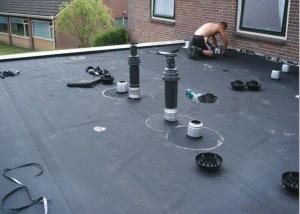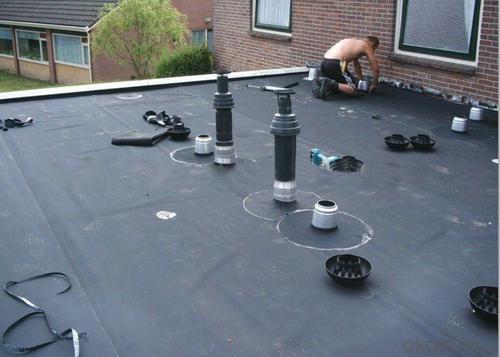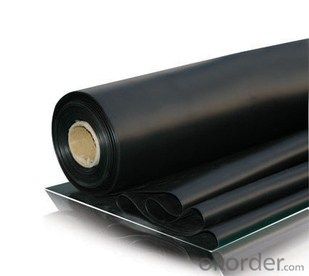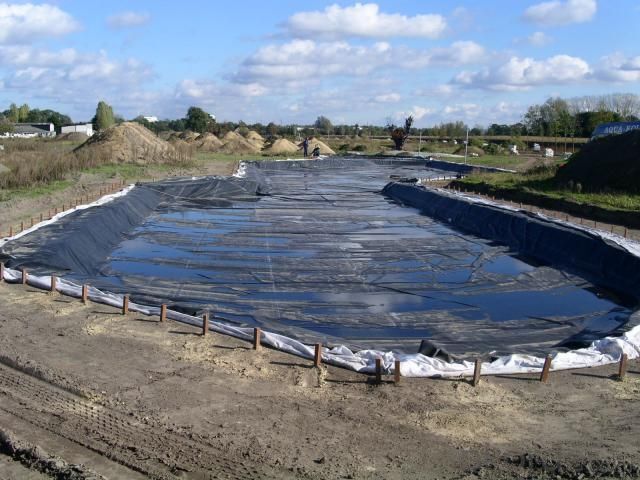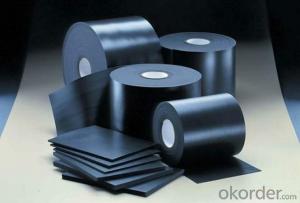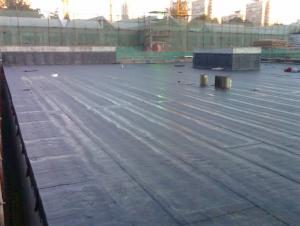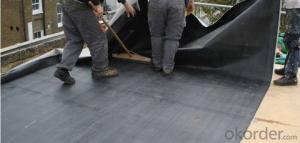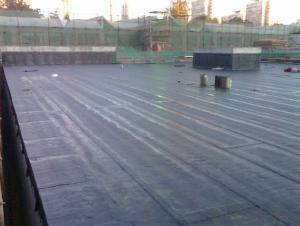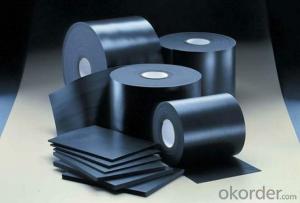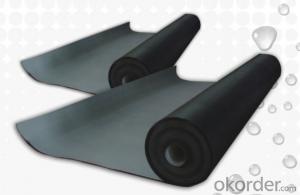EPDM Coiled Rubber Waterproof Membrane with Customized Thickness for Roofing
- Loading Port:
- Shanghai
- Payment Terms:
- TT OR LC
- Min Order Qty:
- 20000 m²
- Supply Capability:
- 5000000 m²/month
OKorder Service Pledge
OKorder Financial Service
You Might Also Like
EPDM Coiled Rubber Waterproof Membrane with Customized Thickness for Roofing
Description Of EPDM Coiled Rubber Waterproof Membrane with Customized Thickness for Roofing:
This waterproof coiled material is of high elasticity with best performance among high polumer
waterproof coiled material in the world.It is also the most typical one in the world.Waterproof coiled material made of ternary ethylene-propylene rubber is produced withthe use of the most advanced contiuous extrusion and vulcanization technology and related equipments which are specially designed for production of such product.It is good in compactness,without bubble and performance difference in length and breadth,perfomances reach or exceedthe demands of GB18173.1-2000 standard.
Main Features of EPDM Coiled Rubber Waterproof Membrane with Customized Thickness for Roofing:
A.Polyester based SBS Modified Bitumen Waterproofing Membrane
a. Strong impermeability
b. High tensile strength, elongation, ability to adapt the grassroots shrinkage deformation and cracking
c. Puncture-resistant, broken resistant, tear-resistant
d. The corrosion resistance, resistance to mildew, weathering good
e. Construction convenient, hot-melt can be operated Four Seasons Construction, reliable joints
B. Fiberglass based SBS Modified Bitumen Waterproofing Membrane
a. High tensile strength, stability of a good size
b. High Temperature good performance
c. Damage resistance, corrosion resistance, resistance to mildew, weathering good performance
d. Good construction performance, reliable joints.
Specifications of EPDM Coiled Rubber Waterproof Membrane with Customized Thickness for Roofing:
| Material | EPDM Rubber |
| Size | 1.2m (width)*20m (length) or customized, weldable type 2.05m or 4m width |
| Thick | 1.2mm, 1.5mm, 2.0mm |
| Type | Vulcanized & Weldable |
| Pattern | Non-reinforced (homogeneous) |
| Certificate | ISO9001/14001 |
Applications of EPDM Coiled Rubber Waterproof Membrane with Customized Thickness for Roofing:
1. Roofs, Basement, Toilet
2. Industrial and civil building waterproofing
3. Geo-synthetic liner for swimming pool, channels, irrigation system
4. Especially suit for projects with high requirements in durability, anti-corrosion and deformation
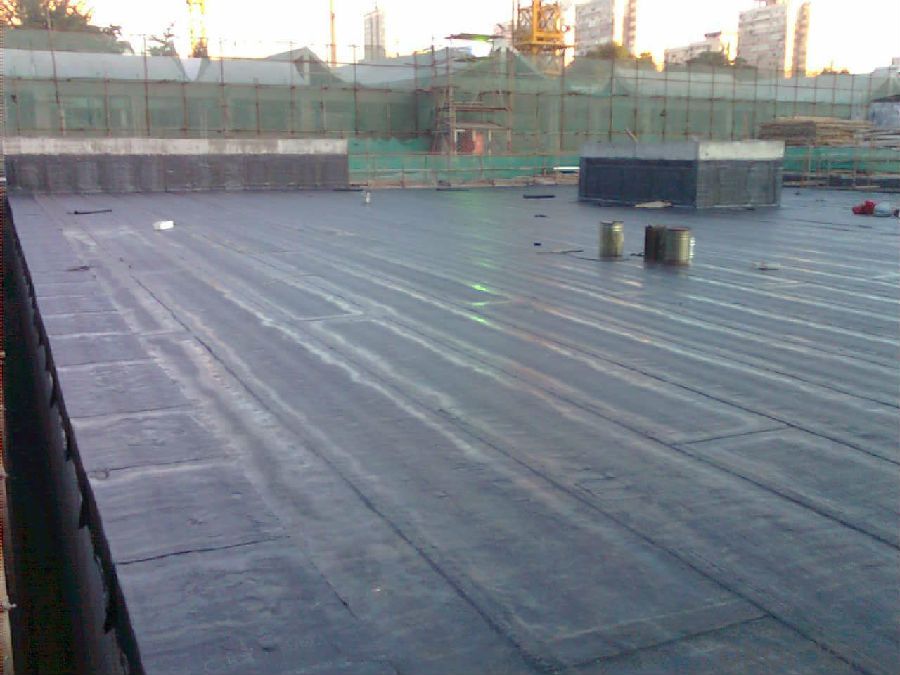
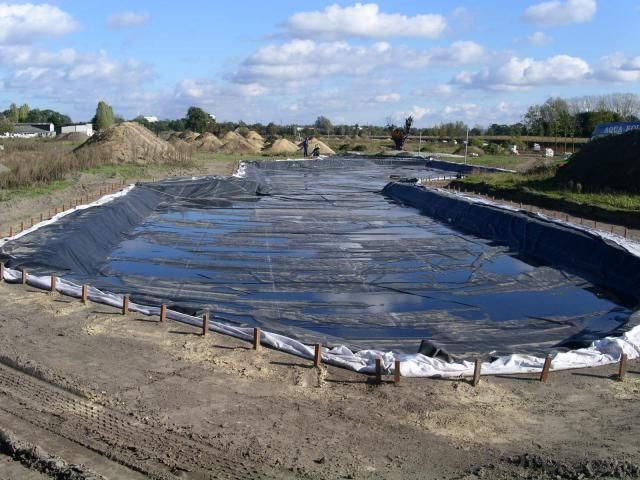
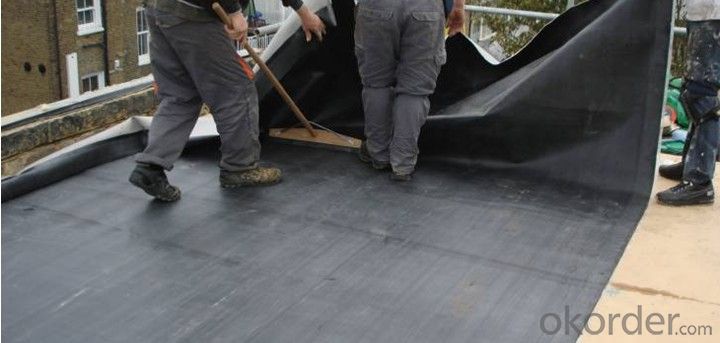
IMages of EPDM Coiled Rubber Waterproof Membrane with Customized Thickness for Roofing:
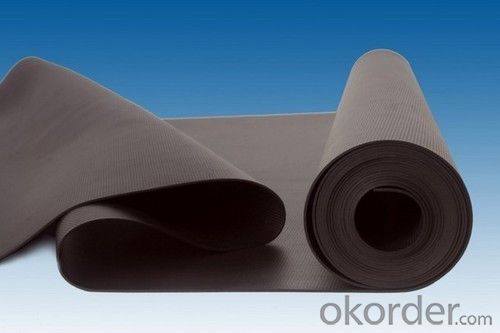
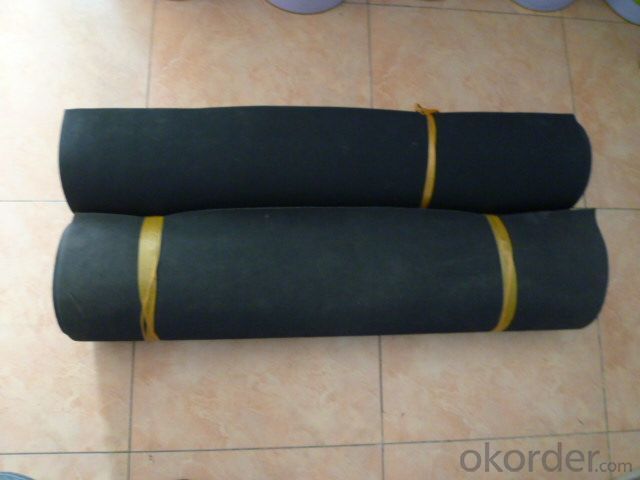
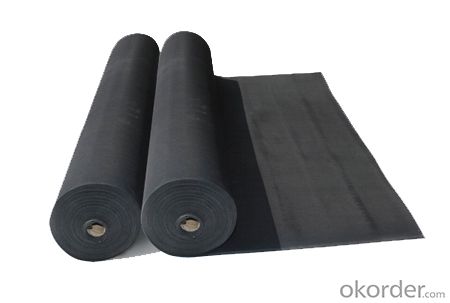
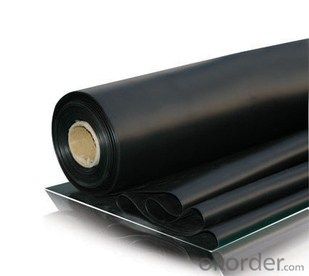
FAQ of EPDM Coiled Rubber Waterproof Membrane with Customized Thickness for Roofing:
1. What are we supplying?
We are specialized in producing Colorful Asphalt Roof Shingle, SBS/APP modified bitumen waterproof membrane, Self adhesive bitumen waterproof membrane, PVC waterproofing membrane, EPDM rubber roofing membrane, Single Component Polyurethane Waterproof Coating, and Spray Polyurea Waterproof Coating
.
2. How Many years experience do we have?
We have been exported to more than 20 countries in the past 15 years.
3. How long do we usually reply your request?
We always reply our customer within 24 hours.
- Q: How does a waterproofing membrane adhere to a variety of surfaces?
- A waterproofing membrane adheres to a variety of surfaces by utilizing a strong adhesive backing or by being applied with a suitable adhesive. This allows it to bond effectively to different materials such as concrete, wood, metal, or even existing waterproofing layers. Additionally, some membranes may also have self-adhesive properties that eliminate the need for an external adhesive.
- Q: Can a waterproofing membrane be used for a basement floor moisture barrier?
- Yes, a waterproofing membrane can be used as a basement floor moisture barrier. A waterproofing membrane is designed to prevent water from seeping through surfaces, making it an effective solution for protecting a basement floor against moisture. By applying a waterproofing membrane, you create a barrier that prevents water from infiltrating the concrete floor, thus reducing the risk of mold, mildew, and water damage. It is important to ensure that the waterproofing membrane is properly installed and covers the entire basement floor to achieve maximum effectiveness. Additionally, it is recommended to consult with a professional to determine the most suitable type of waterproofing membrane for your specific basement floor and moisture conditions.
- Q: Are waterproofing membranes suitable for exterior use?
- Waterproofing membranes are indeed suitable for use on the exterior. These specific membranes are designed to create a barrier against the infiltration of water and are commonly employed in a range of outdoor applications such as rooftops, balconies, and foundations. They are constructed from durable materials capable of withstanding exposure to harsh weather conditions, UV rays, and temperature fluctuations. By preventing water damage, moisture accumulation, and potential structural problems caused by water infiltration, these membranes offer valuable protection. Furthermore, they can be applied to a variety of surfaces including concrete, metal, and wood, making them highly versatile for different outdoor environments. In summary, waterproofing membranes present a reliable solution for safeguarding exterior surfaces from water damage and extending their lifespan.
- Q: Can a waterproofing membrane be used on precast nickel surfaces?
- Yes, a waterproofing membrane can be used on precast nickel surfaces. The membrane will provide a protective barrier against water penetration, helping to prevent moisture damage and corrosion on the nickel surface.
- Q: Can waterproofing membranes be used on concrete manholes?
- Indeed, concrete manholes can benefit from the application of waterproofing membranes. These membranes are widely utilized to safeguard structures against water penetration and can be effectively utilized on various surfaces, including concrete. Given that concrete manholes are susceptible to water ingress, which may result in deterioration and structural problems over time, the application of a waterproofing membrane on the concrete surface of the manhole creates a barrier that prevents water intrusion into the structure. This measure serves to lengthen the lifespan of the manhole and guarantee its structural integrity in the long run. Moreover, in addition to providing protection against chemical attacks and other environmental factors, waterproofing membranes further enhance the durability of concrete manholes.
- Q: Can a waterproofing membrane be used for below-grade parking structures?
- Below-grade parking structures may utilize a waterproofing membrane to prevent water infiltration and safeguard against water-related damage. This type of membrane is frequently employed in construction to create a barrier against water and its detrimental effects. Considering the nature of below-grade parking structures, which are either fully or partially underground, the surrounding soil and groundwater pose an increased risk of water seepage. To counteract this, waterproofing membranes are applied to the exterior surfaces of the structure. These membranes, typically composed of materials like bitumen, rubberized asphalt, PVC, or polyurethane, exhibit exceptional resistance to water penetration. Moreover, certain membranes may possess additional attributes such as crack-bridging capabilities or protection against chemicals or gases. For the optimal selection of a suitable membrane for a specific below-grade parking structure, it is vital to consult with an experienced engineer or waterproofing specialist. Factors such as soil conditions, hydrostatic pressure, and adherence to local building codes must be carefully considered in this decision-making process.
- Q: Can waterproofing membranes be used on concrete pipes?
- Yes, waterproofing membranes can be used on concrete pipes. These membranes provide a protective barrier against water infiltration, preventing any potential leakage or damage to the concrete pipes.
- Q: What is waterproofing membrane?
- Waterproof membrane requirements have good water resistance, stability of the temperature change (high temperature does not flow, no blistering, not confuse; low temperature does not brittle crack), a certain mechanical strength, extensibility and resistance to fracture, to There is a certain degree of flexibility and anti-aging and so on. The waterproofing membrane is a curlable sheet-like waterproofing material. Is one of the important varieties of waterproofing materials in construction engineering.
- Q: Can a waterproofing membrane be used on precast metal surfaces?
- Precast metal surfaces can benefit from the application of a waterproofing membrane. These membranes are specifically designed to create a protective layer that stops water from penetrating the surface. They can be used on various types of surfaces, including precast metal. Waterproofing membranes are typically made from materials like bitumen, liquid coatings, or synthetic rubber. These materials form a barrier that prevents water and moisture from causing damage. When a waterproofing membrane is applied to precast metal surfaces, it helps to prevent corrosion, protects against water damage, and improves the overall durability and lifespan of the metal structure. However, it is crucial to select a waterproofing membrane that is compatible with the specific type of precast metal surface. Additionally, proper surface preparation and application techniques must be followed to ensure optimal performance.
- Q: Can a waterproofing membrane be used in historic buildings?
- Yes, a waterproofing membrane can be used in historic buildings. Historic buildings often face challenges related to moisture infiltration and water damage due to their age and construction materials. Waterproofing membranes are a common solution to prevent water seepage and protect the building's structural integrity. However, it is important to choose a waterproofing membrane that is compatible with the historic building's materials and construction methods to ensure its preservation and adherence to historical authenticity. Additionally, any waterproofing work done on a historic building should be carried out by professionals with expertise in historic preservation to ensure proper installation and minimal impact on the building's historical value.
Send your message to us
EPDM Coiled Rubber Waterproof Membrane with Customized Thickness for Roofing
- Loading Port:
- Shanghai
- Payment Terms:
- TT OR LC
- Min Order Qty:
- 20000 m²
- Supply Capability:
- 5000000 m²/month
OKorder Service Pledge
OKorder Financial Service
Similar products
Hot products
Hot Searches
Related keywords
